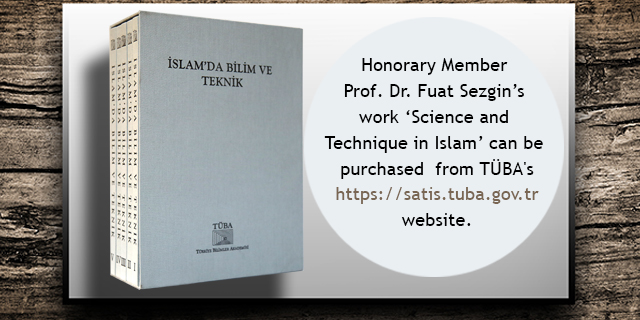The Third Edition of ‘Science and Technology in Islam’ has been released!
The work, prepared after years of research by TÜBA Honorary Member Prof. Dr. Fuat Sezgin and first published in German under the title “Wissenchaft und Technik im Islam” has been reprinted by TÜBA.
‘Science and Technology in Islam’ comprised of five volumes, which was first translated to Turkish from the German original as commissioned by TÜBA then printed first by the Ministry of Culture in 2007 and for a second time by İstanbul Büyükşehir Belediyesi Kültür A.Ş. has now been reprinted for a third time by TÜBA.
The work that compiles the studies and contributions to the world of science of Islamic scientists with a variety of examples in five volumes under the headings of ‘Introduction to Science and Technology in Islam’, ‘Astronomy’, ‘Geography, Maritime, Clocks, Geometry and Optics’, ‘Medicine, Chemistry, Minerals and Fossil Formations’, ‘Physics, Technology, Architecture, War Technology, Antique Objects, Oriental Style European Glass and Ceramics’, also examines the role of Islamic science in the history of world sciences. Prof. Dr. Fuat Sezgin’s work, which has a critical solution approach to the science history that centers around the western world, also reflects a different perspective on Islamic and Middle Age science history.
About the reprinting of this important work, TÜBA President Prof. Dr. Ahmet Cevat Acar says; “The translation and publication of our world famous scientist and Honorary Member Prof. Dr. Fuat Sezgin’s work ‘Science and Technique in Islam’ is an important endeavor of our academy. The work is also very significant in terms of addressing a lack in perspective and awareness of our civilization and science history. I want to thank our Honorary Member Prof. Dr. Fuat Sezgin especially and everyone who contributed to the preparation, translation and publication of this work and of course the Ministry of Culture and İstanbul Büyük Şehir Belediyesi Kültür A.Ş. for the previous prints.”
The ‘Science and Technology in Islam’ can be purchased from TÜBA's https://satis.tuba.gov.tr website.
Who is Prof. Dr. Fuat Sezgin?
He was born on October 24, 1924 in Bitlis. He went to college at the Istanbul University Literature Faculty Oriental Institute and studied under Hellmut Ritter, a German Orientalist with a leading position in the field of Islamic Sciences and Oriental Studies. In response to Ritter’s advice he increased his daily work time to 18 hours. Prof. Dr. Fuat Sezgin, after whom we have named this street in our university, devoted his life to the study of Islamic Sciences and is a scientist accepted as the biggest living authority on this discipline. He read all the sources he used in his work by learning the original language and not from translations. He has learned nearly 30 different languages this way. In 1961 Fuat Sezgin went to Germany and gave classes in the Frankfurt University as a guest teacher. In 1965 he became a professor at the Frankfurt University. For nearly thirty years he has been conducting his studies at the Arab-Islam Sciences History Research Institute, for which he is the founder and director, under the Johann Wolfgang Goethe University in Frankfurt. Around 1400 books have been published at this institute about Islamic Science History. He has learned how to bind the books himself in his library of 10 thousand books comprised of handwritten works. Prof. Dr. Sezgin is also the founder of the Goethe University Arab-Islam Sciences History Research Institute Museum. About 800 objects in this museum about Islamic Science have become a field of natural sciences in the framework of the Arab-Islam culture that is the focus of Fuat Sezgin’s studies and he has done habilitation work on this field in 1965. Starting with the study of Arab-Islam literature history (Geschichte des arabischen Schrifttums) that developed as of the 7./14 Century, which he started while still in Istanbul, he continued in Germany and published the first volume of the 13 volume work, which has become a reference for orientalistic studies and not yet been surpassed, in 1967 and the final volume in 2000. Sezgin, who dealt with all of the main and secondary sciences dealt with in the first periods of Islam, like religion, history, literature, geography and map making in Geschichte des Arabischen Schrifttums, had similar instruments and tools as those prepared for the Arab-Islam Institute, and played a leading role in the opening of the Istanbul Islam, Science and Technology Museum under the Ministry of Culture and Tourism on May 25, 2008.
Prof. Sezgin was the first person to receive the Saudi Arabian King Faisal Foundation Islamic Sciences Award in 1978. He has received an outstanding service award from the Federal Republic of Germany. He has been deemed deserving of many other awards like the Iran Islamic Sciences Book Award. Prof. Dr. Sezgin presently has ongoing work with TÜBA, TÜBİTAK, The Moroccan Science Academy and the Arabic Language Academies in Cairo, Damascus and Baghdad. Prof. Dr. Fuat Sezgin, who is our guest at our University today, is married to colleague Dr. Ursula Sezgin and they live together near Frankfurt.

